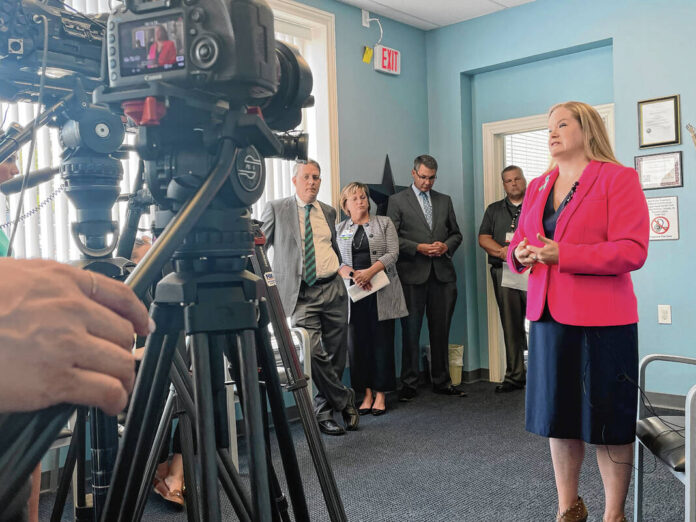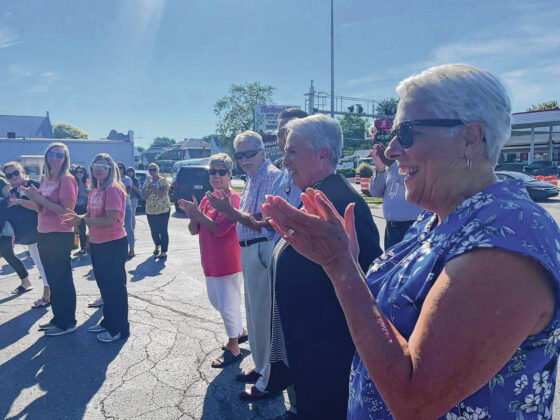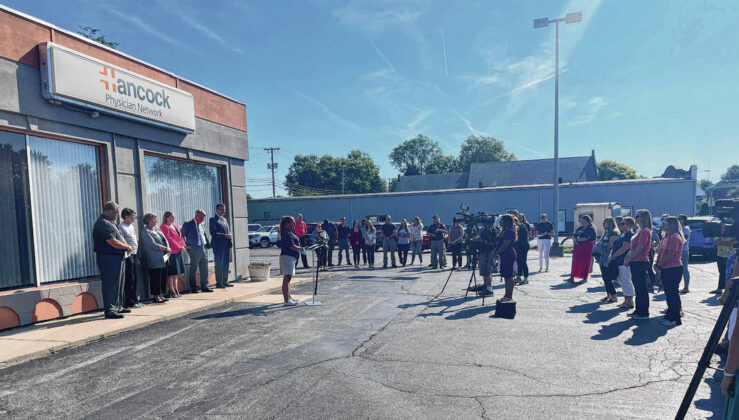
Aimee Herring, Hancock County’s Chief Deputy Prosecutor, addresses the media Aug. 19 about the new Sexual Assault Nurse Examiner program that was launched at the Knightstown Health Care Center and three regional hospitals on Aug. 1. The SANE program trains nurses to compassionately treat victims of sexual assault and collect evidence that can be crucial in prosecuting offenders.
KNIGHTSTOWN — A new program for sexual assault victims was launched at the Knightstown Health Care Center on Aug. 1, and at least four victims have already come in for treatment.
“To have four survivors already here in 18 days of operation, when it wasn’t widely known that this was up and running, speaks volumes to the need for this in this community,” said Hancock County Chief Deputy Prosecutor Aimee Herring, who addressed the media at the clinic on Monday.
The new Sexual Assault Nurse Examiner program is a collaborative effort between Hancock Health, Henry Community Health, Rush Memorial Hospital and the prosecutors’ offices of Hancock and Henry counties.
Prosecutors, law enforcement and health officials from all three counties gathered at the clinic Aug. 19 to publicize the new program.
Development of the local Sexual Assault Nurse Examiner (SANE) program was funded by a $325,000 grant from the Indiana State Department of Health’s Office of Women’s Health. A dozen nurses have been trained since the grant was received last December.
The program educates nurses on how to provide the highest level of care to victims of sexual assault, including collecting forensic evidence if the survivor chooses to prosecute. Assault survivors throughout east central Indiana are now able to receive free medical care at the Knightstown clinic following an assault, or at one of the partnering hospitals whenever the clinic isn’t open.
Susie Neely, who oversees the Knightstown Health Care Center, was instrumental in getting the program up and running. She said she couldn’t be happier to see it all come together.
“It’s finally here. It took a lot of work to get here,” she said.
Although she received a round of applause at Monday’s press conference, Neely said she was just one of many who put in the hard work to make the local SANE program a reality.
Herring said the program was “long overdue.”
The SANE program is there to provide sexual assault survivors with compassion support and healthcare, she said, with an emphasis on putting the survivor’s needs first. Herring said the program also increases the chances for successfully prosecuting offenders.
“I think this is a great step forward for our patients,” said Shelley Wilson, director of nursing at Henry Community Health, who is happy to be working in collaboration with Hancock Health and Rush Memorial Hospital.
“For patients who have already been through so much trauma, anything we can do to provide them care is wonderful,” she said, noting that many sexual assault victims don’t seek care following an attack due to a variety of barriers.
Herring said the new program helps sexual assault victims overcome many of those barriers they’ve faced in the past, such as being forced to drive as far as Anderson or Richmond to receive an exam.
Before the local collaborative SANE program was launched this month, “survivors have had to travel outside of their own jurisdiction, which could mean a 30-minute, 45-minute, even an hour-and-a-half-long drive,” said the deputy prosecutor.
“Sometimes that means a ride with a police officer or with an advocate, or sometimes it means the survivor must find their own transportation with a friend, which can also be a barrier,” she said.
Those barriers can lead to not only missing out on the ability to collect forensic evidence that’s critical to convicting offenders, they can also prevent survivors from receiving much-needed healthcare.
“First and foremost it’s about making sure the patient is okay, physically and mentally,” said Herring, which includes providing a free medical exam, pregnancy test and potentially medication for sexually transmitted diseases, as well as providing local resources for mental health care.
If a survivor chooses to prosecute, Herring said time is of the essence for collecting criminal evidence.
“The chances of law enforcement being able to recover forensic evidence for prosecution decrease with every hour that ticks by,” she said. “So by offering local, accessible, convenient medical treatment — with the option for forensic collection — that increases the likelihood of potential prosecution, and ultimately holding offenders accountable at a higher level than we have been able to do before.”
Jenn Wells, marketing director for Hancock Regional Hospital, encouraged all those in attendance at Monday’s press conference to spread the word about the new SANE program throughout the tri-county area.
“It takes a village,” she said, “and this village needs to continue to grow.”





